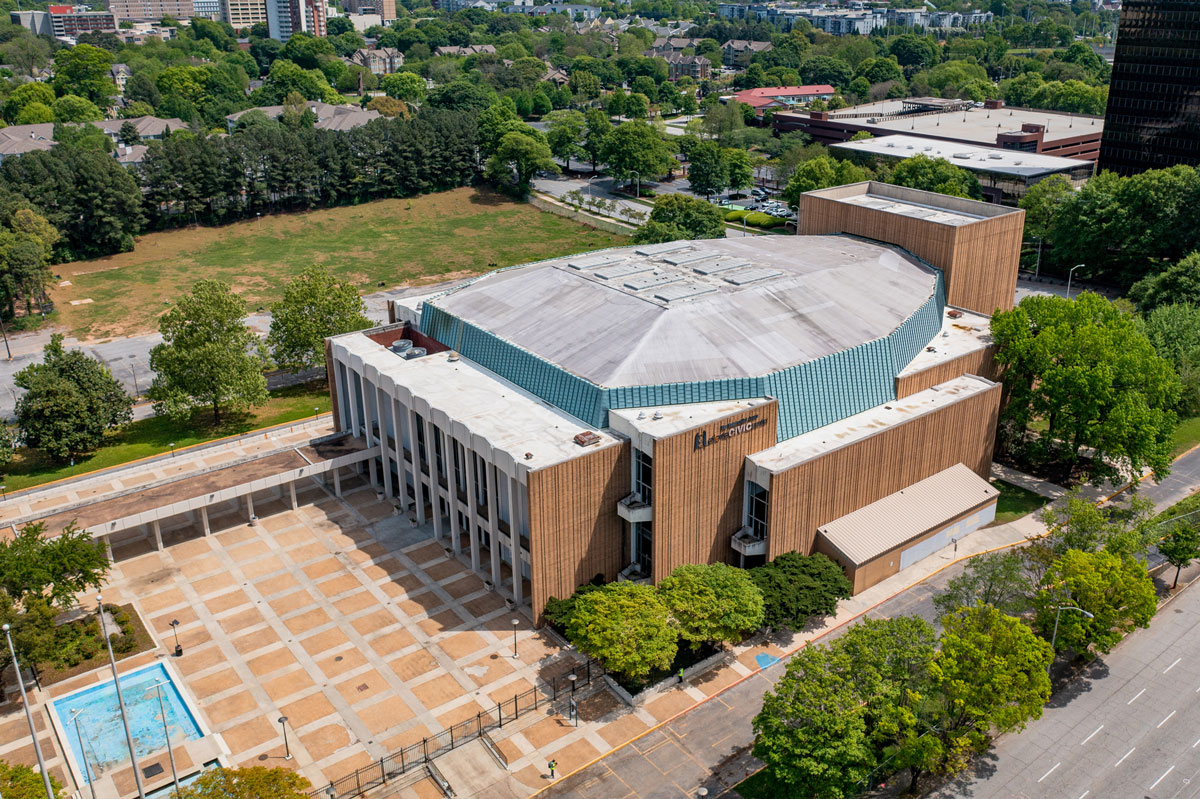
Courtesy of Atlanta Housing Authority
Today, its parking lots are empty and its stage dark, but for decades, the Boisfeuillet Jones Atlanta Civic Center was the crown jewel of the city’s arts and culture scene. Opened with great fanfare in 1968, the Civic Center once drew huge crowds to its 4,600-seat auditorium, and everyone from rock stars to symphony conductors clamored to perform on the largest stage in the Southeast. But as the years dragged on, the buildings lost their splendor, and audiences began complaining of poor acoustics and lousy sightlines. Bookings dwindled, and in 2015, the Civic Center’s lights went out for the last time.
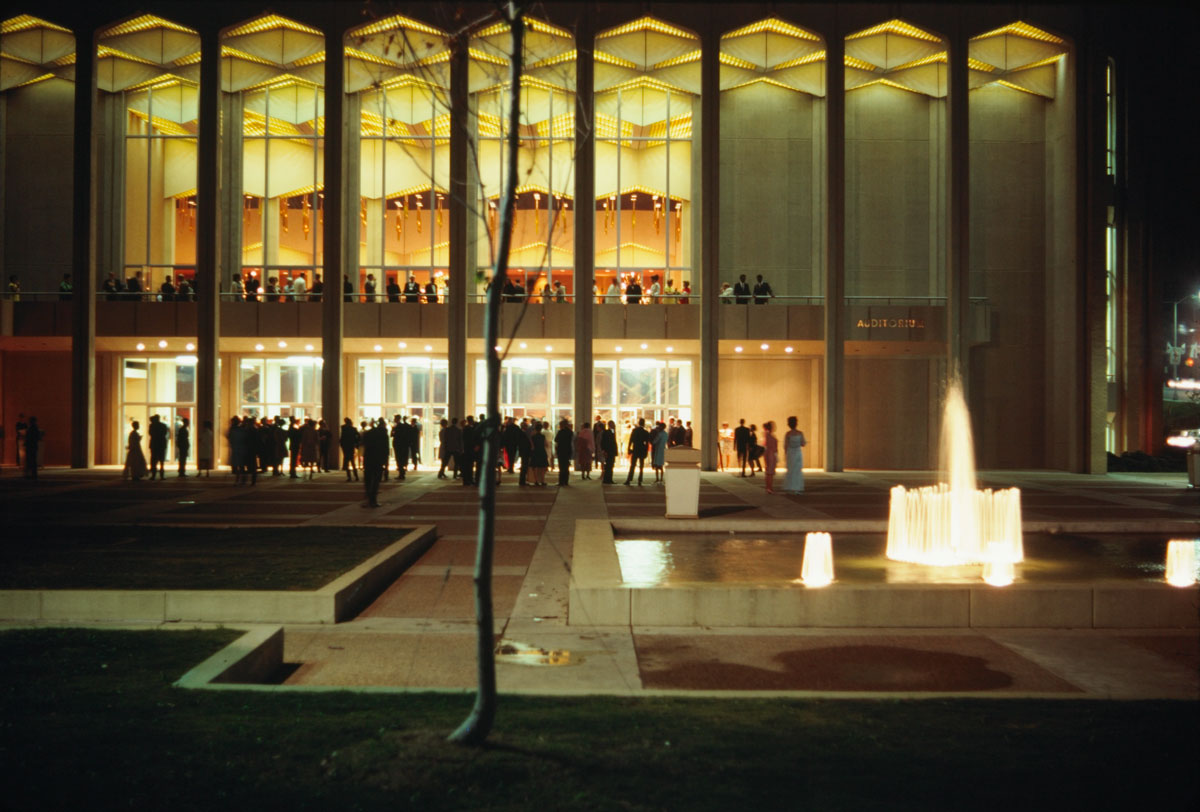
Courtesy of Kenan Research Center at the Atlanta History Center
But things are looking brighter for the aging New Formalist landmark. The Atlanta Housing Authority, which purchased the sprawling facility from the city in 2017, has outlined a plan to preserve and update the historic auditorium, while transforming the surrounding complex into a mix of affordable and market-rate housing, retail, and shared public space. “Preservation will meet innovation,” Atlanta Housing Authority President and CEO Eugene Jones, Jr. told Atlanta. “It will be a true asset to the community.”
Atlanta Housing Authority is funded by the U.S. Department of Housing and Urban Development (HUD), which provides and facilitates affordable housing throughout the city. They don’t build projects themselves, so they’re currently selecting a real estate developer partner to help them transform the complex. After requesting proposals from interested developers last September, AH will select from a shortlist of five finalists. In an email response to Atlanta, LaConia J. Dean, AH’s interim senior vice president of communications, marketing, and public engagement, said the committee expects to present a finalist to the Board of Commissioners for approval at the end of April. Due to the active review process, she declined to name the candidates under consideration.
In their request for qualifications from developers, the Housing Authority stipulated that proposed designs must include both affordable and market-rate housing, and a plan for preserving the Performing Arts Center, all or part of the Exhibition Hall, and the Civic Plaza. In her email, Dean noted that preserving the historic buildings will be expensive, requiring “public, private, and philanthropic partnership and investments.” The auditorium itself is eligible for listing on the National Register of Historic Places, which is often a necessary condition to secure preservation grants through governments and private foundations.
Once AH secures a developer partner, the project could break ground as early as 2023. It’s a promising step forward in a process that’s dragged on for nearly a decade: in 2015, Texas developer Weingarten Realty offered to tear down the theater and build a nearly $300 million mixed-use complex, but after critics decried the lack of public input and the loss of historic buildings, negotiations with the city fell apart. Afterward, Historic Atlanta, a non-profit committed to protecting the city’s historic spaces, advocated for a redevelopment plan that preserved the performance space, a strategy AH incorporated when it purchased the property.
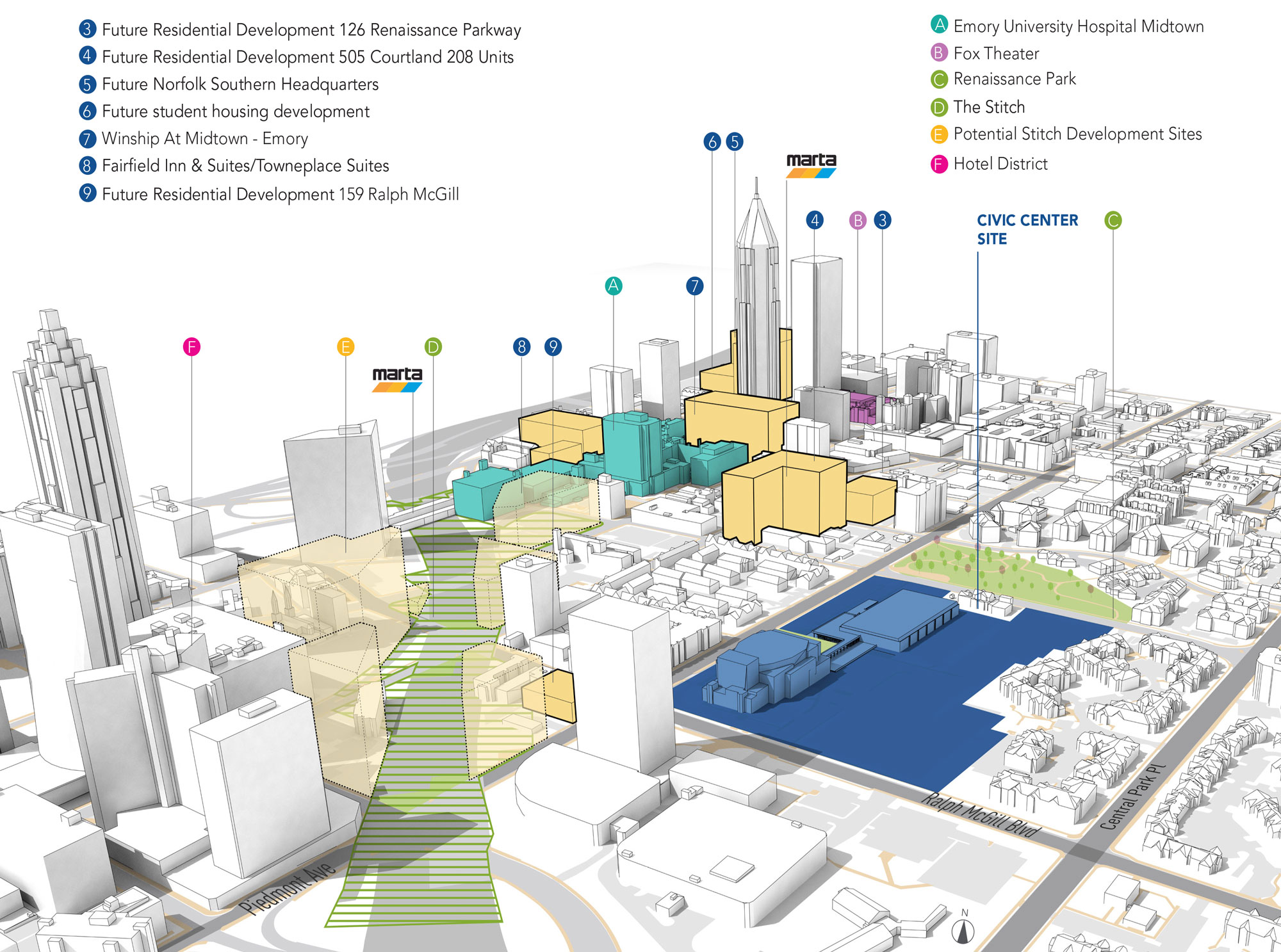
Courtesy of Atlanta Housing Authority
The rise and fall of the Atlanta Civic Center–which added Boisfeuillet Jones to its name in 2001 to honor the Atlanta philanthropist—reflects the city’s own tumultuous history. Mayor Ivan Allen Jr. commissioned the project in 1965, part of his vision for a booming Atlanta built on civic pride, business investment, and interracial cooperation. It was the peak of “white flight,” and Atlanta’s wealthy white arts patrons were fleeing the city for segregated suburbs, but Allen insisted that the performance hall be built downtown, accessible to Atlantans both Black and white. As was so often the case, however, that meant demolishing a working-class Black community, Buttermilk Bottom, to make room for the new buildings, designed by the bespoke architect Harold Montague. Mayor Allen used federal urban renewal funds—part of President Lyndon Johnson’s Great Society program—for “slum clearance,” ultimately displacing around 67,000 Black Atlantans over the course of his tenure in the name of civic improvement.
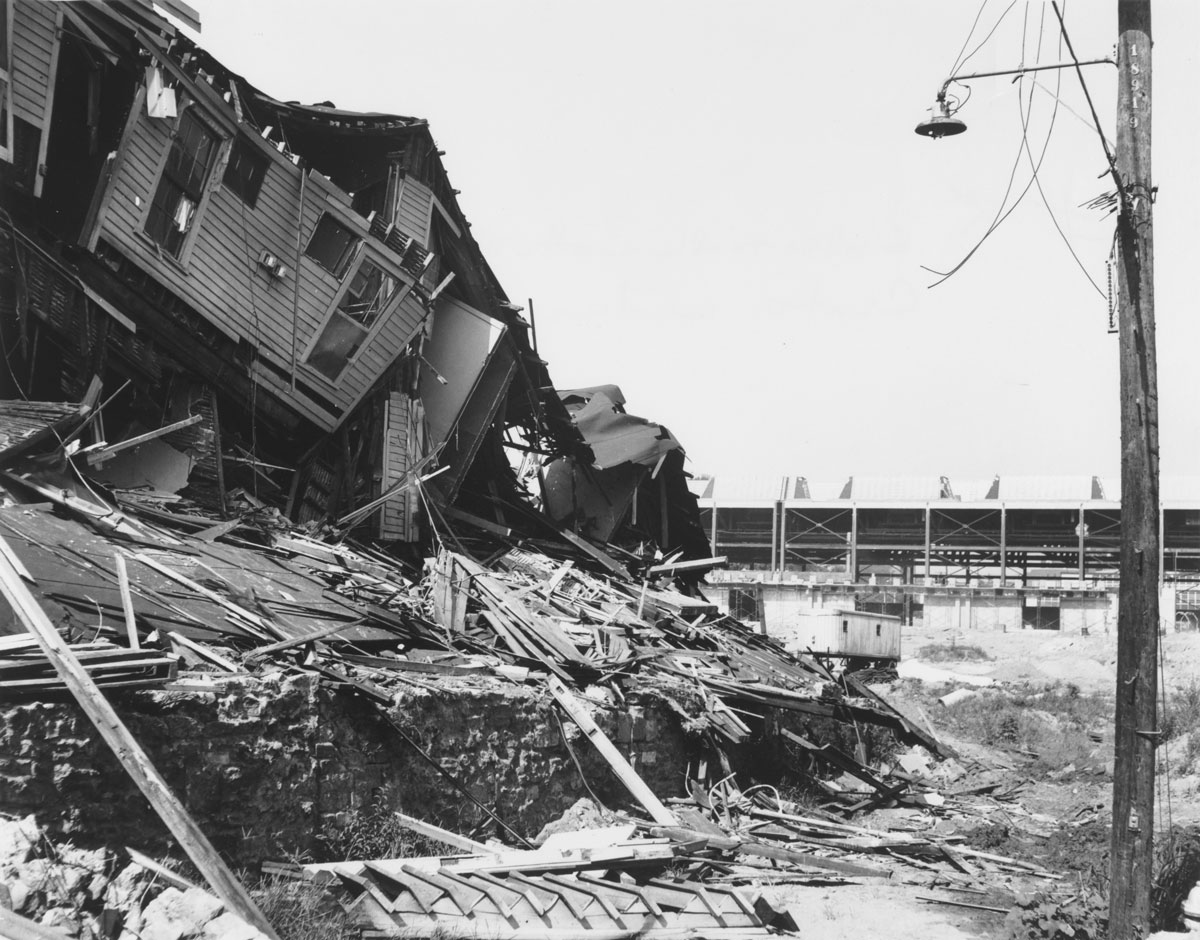
Courtesy of Kenan Research Center at the Atlanta History Center
Nevertheless, the Center opened to great acclaim, with an inaugural performance by the Atlanta Symphony Orchestra; afterwards, a breathless dispatch from one of the city’s newspapers praised the “free standing staircases, covered with vinyl that looks like gold leaf,” and its crystal chandeliers “like explosions of light,” designed by a haute New York atelier. The Metropolitan Opera performed there for 19 seasons, Theater of the Stars for 21, and touring shows of all stripes filled its auditorium for decades.
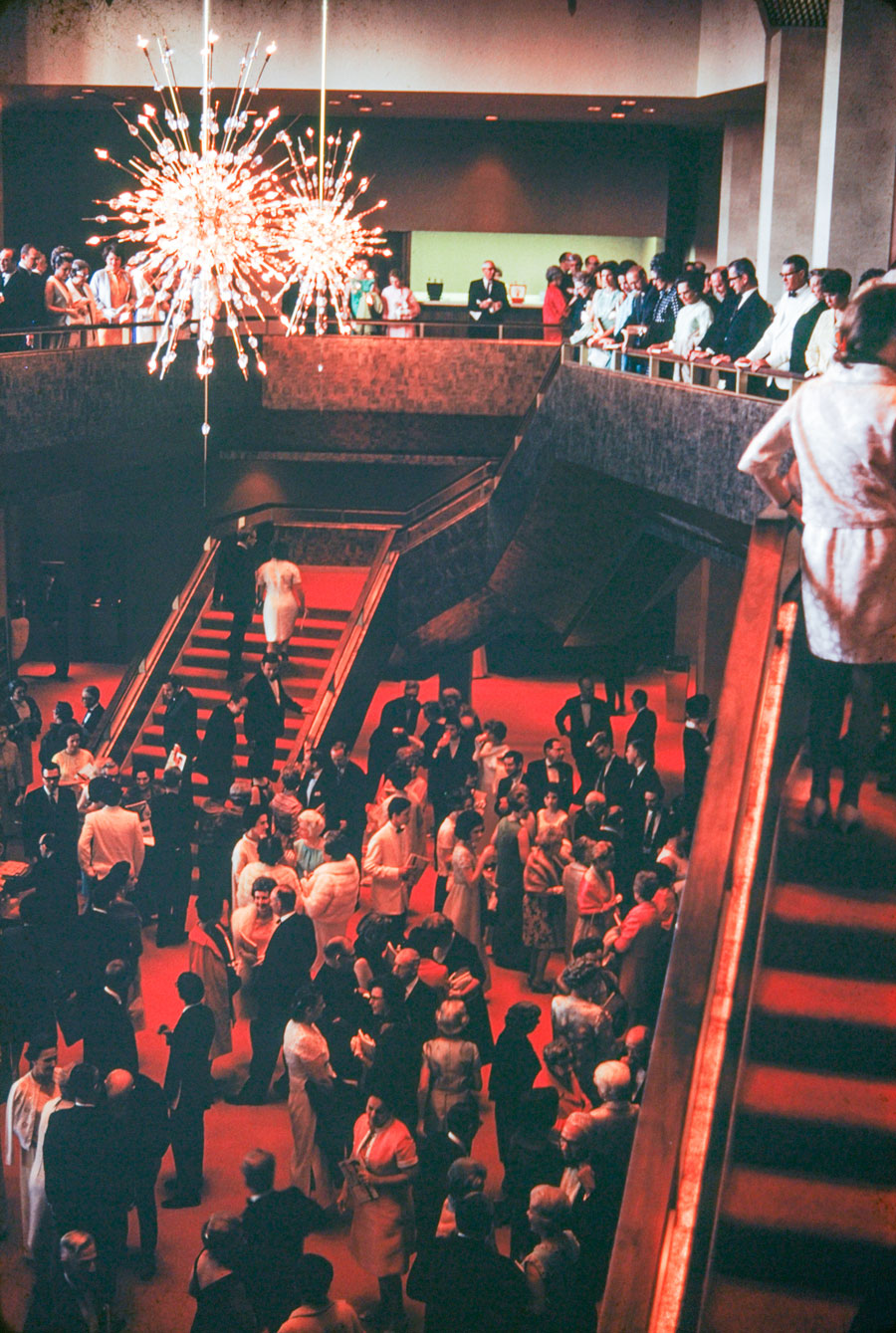
Courtesy of Kenan Research Center at the Atlanta History Center
By the 1980s, however, the Civic Center’s star had begun to fade: new state-of-the-art theaters, including the freshly revitalized Fox, began enticing performers to their stages, while years of economic and social neglect decimated Atlanta’s urban core. The MARTA rail system, completed in 1979, included a Civic Center stop, but at half a mile away through downtown streets, it didn’t exactly entice suburbanites.
In 2007, Atlanta Opera, the Civic Center’s last tenant, decamped to Cobb Energy Performing Arts Center; in a telling press release, they noted that most of their subscribers lived closer to the new theater. Struggling to book performers, the Civic Center began steadily losing money, and by 2015, Mayor Kasim Reed was exasperated by the cost of upkeep. Hoping to free up city funds for an infrastructure bond, he began looking for a buyer.
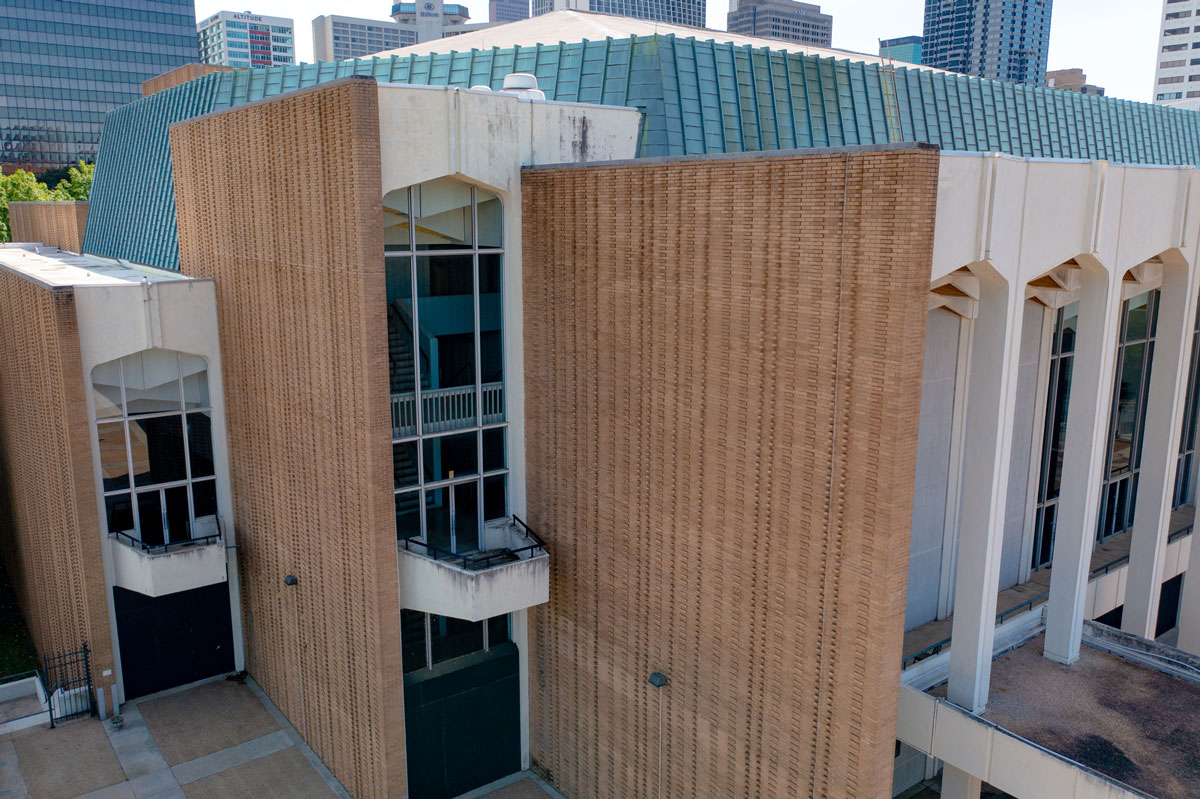
Courtesy of Atlanta Housing Authority
But as Atlanta’s economic tides have turned, so too have the dusty old performance hall’s. The Atlanta Civic Center now sits on some of the city’s hottest land, and new residents flocking to Atlanta are hungry for higher-density, walkable neighborhoods, of the sort Atlanta Housing intends to build on the site.
In fact, after decades of neglect, the city is now buckling under a critical affordable housing shortage, an issue Atlanta Housing Authority hopes to address with its plans for the Civic Center complex. According to Atlanta Housing, a minimum of 33 percent of units must be affordable for individuals with incomes up to 120 percent of the HUD Area Median Income. At least 260 units must use an AH rental subsidy to help lower monthly rent costs, and the affordable units will have a deed restriction to preserve affordability.
“This project is one of the most important mixed-income, mixed-use projects we can do,” Mayor Andre Dickens told Atlanta Civic Circle in January. “I want it executed well and quickly.”
That’s welcome news for many surrounding residents, who are eager to see the site’s acres of vacant concrete transformed into usable community space. And for the thousands of Atlantans who visited the Civic Center for concerts, Broadway musicals, political events, ballet performances, and even a season of Family Feud, the restoration of the performance space will preserve those memories and create opportunities for new ones.
“When I was a little boy in the 1970s, my family went to see Liza Minelli and Liberace concerts at the Civic Center,” a commenter wrote in response to an Urbanize Atlanta article about the site’s revitalization. “I remember snippets of each show from our balcony seats.”













